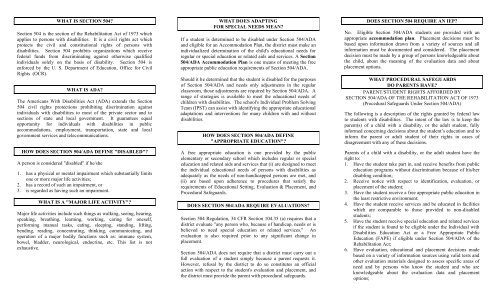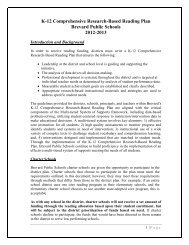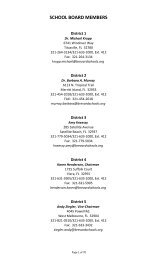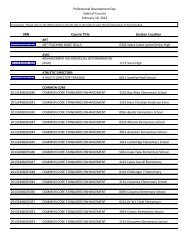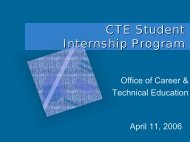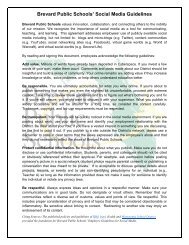WHAT IS SECTION 504? - Brevard Public Schools
WHAT IS SECTION 504? - Brevard Public Schools
WHAT IS SECTION 504? - Brevard Public Schools
You also want an ePaper? Increase the reach of your titles
YUMPU automatically turns print PDFs into web optimized ePapers that Google loves.
<strong>WHAT</strong> <strong>IS</strong> <strong>SECTION</strong> <strong>504</strong>?<br />
Section <strong>504</strong> is the section of the Rehabilitation Act of 1973 which<br />
applies to persons with disabilities. It is a civil rights act which<br />
protects the civil and constitutional rights of persons with<br />
disabilities. Section <strong>504</strong> prohibits organizations which receive<br />
federal funds from discriminating against otherwise qualified<br />
individuals solely on the basis of disability. Section <strong>504</strong> is<br />
enforced by the U. S. Department of Education, Office for Civil<br />
Rights (OCR).<br />
<strong>WHAT</strong> <strong>IS</strong> ADA?<br />
The Americans With Disabilities Act (ADA) extends the Section<br />
<strong>504</strong> civil rights protections prohibiting discrimination against<br />
individuals with disabilities to most of the private sector and to<br />
sections of state and local government. It guarantees equal<br />
opportunity for individuals with disabilities in public<br />
accommodations, employment, transportation, state and local<br />
government services and telecommunications.<br />
HOW DOES <strong>SECTION</strong> <strong>504</strong>/ADA DEFINE "D<strong>IS</strong>ABLED"?<br />
A person is considered "disabled" if he/she<br />
1. has a physical or mental impairment which substantially limits<br />
one or more major life activities;<br />
2. has a record of such an impairment, or<br />
3. is regarded as having such an impairment.<br />
<strong>WHAT</strong> <strong>IS</strong> A "MAJOR LIFE ACTIVITY"?<br />
Major life activities include such things as walking, seeing, hearing,<br />
speaking, breathing, learning, working, caring for oneself,<br />
performing manual tasks, eating, sleeping, standing, lifting,<br />
bending, reading, concentrating, thinking, communicating, and<br />
operation of a major bodily functions such as: immune system,<br />
bowel, bladder, neurological, endocrine, etc. This list is not<br />
exhaustive.<br />
<strong>WHAT</strong> DOES ADAPTING<br />
FOR SPECIAL NEEDS MEAN?<br />
If a student is determined to be disabled under Section <strong>504</strong>/ADA<br />
and eligible for an Accommodation Plan, the district must make an<br />
individualized determination of the child's educational needs for<br />
regular or special education or related aids and services. A Section<br />
<strong>504</strong>/ADA Accommodation Plan is one means of meeting the free<br />
appropriate public education requirements of Section <strong>504</strong>/ADA.<br />
Should it be determined that the student is disabled for the purposes<br />
of Section <strong>504</strong>/ADA and needs only adjustments in the regular<br />
classroom, those adjustments are required by Section <strong>504</strong>/ADA. A<br />
range of strategies is available to meet the educational needs of<br />
children with disabilities. The school's Individual Problem Solving<br />
Team (IPST) can assist with identifying the appropriate educational<br />
adaptations and interventions for many children with and without<br />
disabilities.<br />
HOW DOES <strong>SECTION</strong> <strong>504</strong>/ADA DEFINE<br />
"APPROPRIATE EDUCATION"?<br />
A free appropriate education is one provided by the public<br />
elementary or secondary school which includes regular or special<br />
education and related aids and services that (i) are designed to meet<br />
the individual educational needs of persons with disabilities as<br />
adequately as the needs of non-handicapped persons are met, and<br />
(ii) are based upon adherence to procedures that satisfy the<br />
requirements of Educational Setting, Evaluation & Placement, and<br />
Procedural Safeguards.<br />
DOES <strong>SECTION</strong> <strong>504</strong>/ADA REQUIRE EVALUATIONS?<br />
Section <strong>504</strong> Regulation, 34 CFR Section 104.35 (a) requires that a<br />
district evaluate "any person who, because of handicap, needs or is<br />
believed to need special education or related services." An<br />
evaluation is also required prior to any significant change in<br />
placement.<br />
Section <strong>504</strong>/ADA does not require that a district must carry out a<br />
full evaluation of a student simply because a parent requests it.<br />
However, refusal by the district to do so constitutes an official<br />
action with respect to the student's evaluation and placement, and<br />
the district must provide the parent with procedural safeguards.<br />
DOES <strong>SECTION</strong> <strong>504</strong> REQUIRE AN IEP?<br />
No. Eligible Section <strong>504</strong>/ADA students are provided with an<br />
appropriate accommodation plan. Placement decisions must be<br />
based upon information drawn from a variety of sources and all<br />
information must be documented and considered. The placement<br />
decision must be made by a group of persons knowledgeable about<br />
the child, about the meaning of the evaluation data and about<br />
placement options.<br />
<strong>WHAT</strong> PROCEDURAL SAFEGUARDS<br />
DO PARENTS HAVE?<br />
PARENT/STUDENT RIGHTS AFFORDED BY<br />
<strong>SECTION</strong> <strong>504</strong>/ADA OF THE REHABILITATION ACT OF 1973<br />
(Procedural Safeguards Under Section <strong>504</strong>/ADA)<br />
The following is a description of the rights granted by federal law<br />
to students with disabilities. The intent of the law is to keep the<br />
parent(s) of a child with a disability, or the adult student, fully<br />
informed concerning decisions about the student’s education and to<br />
inform the parent or adult student of their rights in cases of<br />
disagreement with any of these decisions.<br />
Parents of a child with a disability, or the adult student have the<br />
right to:<br />
1. Have the student take part in, and receive benefits from public<br />
education programs without discrimination because of his/her<br />
disabling condition;<br />
2. Receive notice with respect to identification, evaluation, or<br />
placement of the student;<br />
3. Have the student receive a free appropriate public education in<br />
the least restrictive environment;<br />
4. Have the student receive services and be educated in facilities<br />
which are comparable to those provided to non-disabled<br />
students;<br />
5. Have the student receive special education and related services<br />
if the student is found to be eligible under the Individual with<br />
Disabilities Education Act or a Free Appropriate <strong>Public</strong><br />
Education (FAPE) if eligible under Section <strong>504</strong>/ADA of the<br />
Rehabilitation Act;<br />
6. Have evaluation, educational and placement decisions made<br />
based on a variety of information sources using valid tests and<br />
other evaluation materials designed to assess specific areas of<br />
need and by persons who know the student and who are<br />
knowledgeable about the evaluation data and placement<br />
options;
7. Have transportation provided to and from an alternative<br />
placement setting (if the setting is a program not operated by<br />
the district) at no greater cost to the parent or adult student than<br />
would be incurred if the student were placed in a program<br />
operated by the district;<br />
8. Have the student be given an equal opportunity to participate in<br />
nonacademic and extracurricular activities offered by the<br />
district;<br />
9. Examine all relevant records relating to decisions regarding the<br />
student’s identification, evaluation, educational program and<br />
placement;<br />
10. Obtain copies of educational records at a reasonable cost<br />
unless the fee would effectively deny the parent or adult<br />
student access to the records;<br />
11. Request amendment of the student’s educational records if<br />
there is reasonable cause to believe that they are inaccurate,<br />
misleading, or otherwise in violation of the privacy rights of<br />
the student. If the school district refuses this request for<br />
amendment, it shall notify the parent or adult student within a<br />
reasonable time and advise them of the right to a hearing;<br />
12. File a local grievance;<br />
13. Request an impartial hearing related to decisions or actions<br />
regarding the student’s identification, evaluation, educational<br />
program, or placement. The parent, the adult student and the<br />
minor child may take part in the hearing and be represented by<br />
counsel. Hearing requests must be made to the District Section<br />
<strong>504</strong>/ADA Coordinator and<br />
14. Appeal the impartial hearing officer's decision to a court of<br />
competent jurisdiction.<br />
The person in your district responsible for assuring compliance is<br />
Pamela Treadwell, District Section <strong>504</strong>/ADA Coordinator, Director<br />
of ESE Administrative Support Services who can be reached at<br />
(321) 633-1000, extension 505.<br />
<strong>WHAT</strong> CAN I DO IF I HAVE A<br />
<strong>SECTION</strong> <strong>504</strong>/ADA GRIEVANCE?<br />
Many Section <strong>504</strong>/ADA grievances can be resolved by an informal<br />
meeting with the parties and the principal. An individual with a<br />
complaint is encouraged to discuss it with the teacher, Section <strong>504</strong><br />
school contact person or principal with the objective of resolving<br />
the matter promptly and informally.<br />
Grievances that cannot be resolved at the school level can be<br />
deliberated through the Grievance Procedures or Impartial Hearing<br />
Procedures outlined in the Section <strong>504</strong>/ADA Procedures Manual<br />
available at all schools or www.brevardschools.org.<br />
At any time during the grievance process, a grievant may file a<br />
complaint directly with the Office for Civil Rights. If you require<br />
further information, you may contact Pamela Treadwell, District<br />
Coordinator for Section <strong>504</strong>/ADA at (321) 633-1000, extension<br />
505.<br />
NOND<strong>IS</strong>CRIMINATION NOTICE<br />
It is the policy of the School Board of <strong>Brevard</strong> County to offer the opportunity to all students to participate<br />
in appropriate programs and activities without regard to race, color, gender, religion, national origin,<br />
disability, marital status, or age, except as otherwise provided by Federal law or by Florida state law.<br />
A student having a grievance concerning discrimination may contact:<br />
Dr. Brian T. Binggeli<br />
Superintendent<br />
<strong>Brevard</strong> <strong>Public</strong> <strong>Schools</strong><br />
Dr. Walter Christy, Director<br />
Office of Secondary Programs<br />
School Board of <strong>Brevard</strong> County<br />
2700 Judge Fran Jamieson Way<br />
Viera, Florida 32940-6601<br />
(321) 633-1000<br />
Ms. Cyndi Van Meter<br />
Associate Superintendent,<br />
Division of Curriculum<br />
and Instruction,<br />
Equity Coordinator<br />
Ms. Pamela Treadwell<br />
Director,<br />
ESE Administrative Support Services<br />
ADA/Section <strong>504</strong> Coordinator<br />
It is the policy of the School Board of <strong>Brevard</strong> County not to discriminate against employees or applicants<br />
for employment on the basis of race, color, religion, sex, national origin, participation and membership in<br />
professional or political organizations, marital status, age, or disability. Sexual harassment is a form of<br />
employee misconduct which undermines the integrity of the employment relationship, and is prohibited.<br />
This policy shall apply to recruitment, employment, transfers, compensation, and other terms and<br />
conditions of employment.<br />
An employee or applicant having a grievance concerning employment may contact:<br />
Ms. Susan Standley, Director<br />
Office of<br />
Compensation & Benefits<br />
School Board of <strong>Brevard</strong> County<br />
2700 Judge Fran Jamieson Way<br />
Viera, Florida 32940-6601<br />
(321) 633-1000<br />
Ms. Joy Salamone, Director<br />
Human Resources Services<br />
and Labor Relations<br />
This <strong>Public</strong>ation or portions of this publication can be made available to persons with disabilities in a<br />
variety of formats, including large print, Braille or audiotape. Telephone or written request should include<br />
your name, address, and telephone number. Requests should be made to Kim Riddle, Exceptional Education<br />
Projects, 633-1000, ext. 535, at least two (2) weeks prior to the time you need the publication.<br />
<strong>Brevard</strong> <strong>Public</strong> <strong>Schools</strong>, Florida<br />
2010 - 2011


